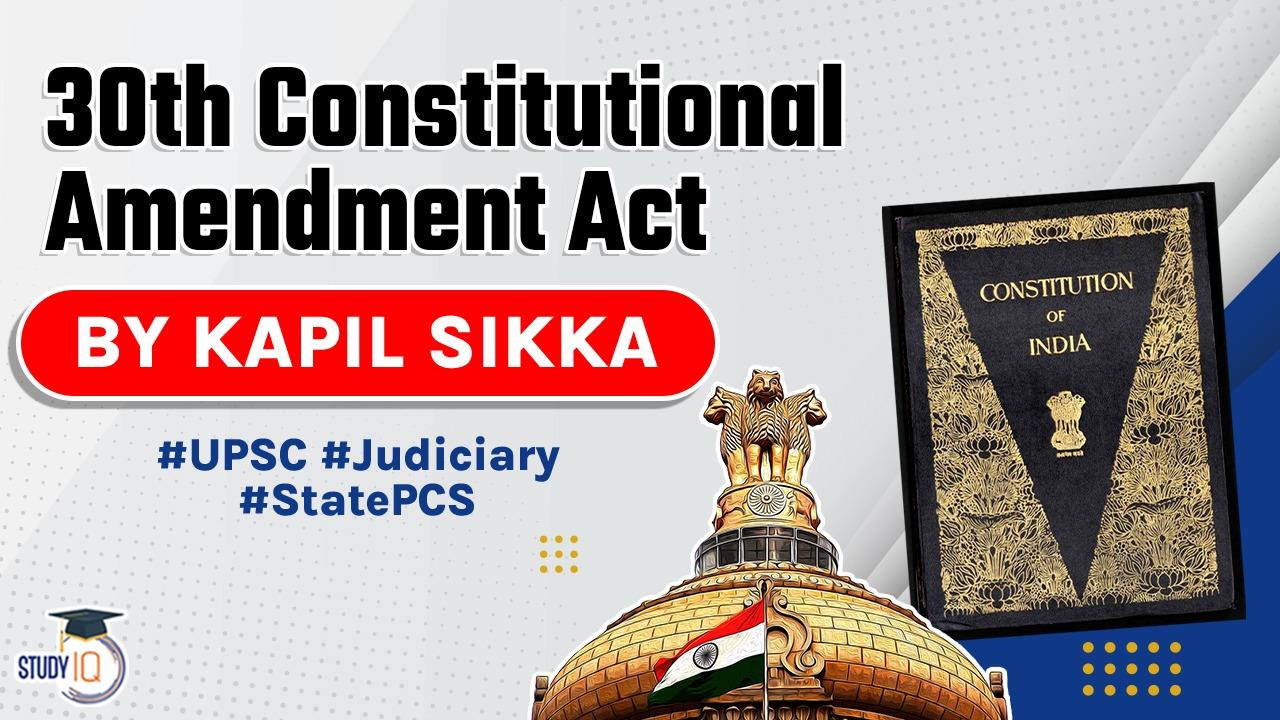Table of Contents
30th Amendment 1972

STATEMENT OF OBJECTS AND REASONS
- This Bill seeks to give effect to the recommendations of the Law Commission of India in its Forty-fourth and Forty-fifth Reports on Civil Appeals to the Supreme Court on certificate of fitness.
- At present an appeal lies to the Supreme Court, inter alia, on a certificate given by a High Court that the amount or the value of the subject-matter of dispute is not less than twenty thousand rupees or that the judgment, decree or final order involves, directly or indirectly, some claim or question respecting property of the like amount
- The valuation cannot be the rational yardstick for a right to appeal.
- An important question of law can arise even in suits of small value and the test of valuation results in cases without merit going up to the Supreme Court.
- The Law Commission recommended that clauses (a) and (b) of article 133(1) of the Constitution should be omitted and that an appeal should lie to the Supreme Court only if the High Court certifies that the case involves a substantial question of law of general importance and that in the opinion of the High Court the said question needs to be decided by the Supreme Court.
- The amendment of the article accordingly would curtail the number of appeals which are filed in the Supreme Court merely on the valuation test being satisfied, without any merit in them.
- Amendment of article 133.-In article 133 of the Constitution, for clause (1), the following clause shall be substituted, namely:-
- “(1) An appeal shall lie to the Supreme Court from any judgment, decree or final order in a civil proceeding of a High Court in the territory of India if the High Court certifies-
- (a) that the case involves a substantial question of law of general importance; and
- (b) that in the opinion of the High Court the said question needs to be decided by the Supreme Court.”.
Jurisdiction of the Supreme Court
- The Supreme Court has
- Original,
- Appellate and
- Advisory jurisdiction
- The appellate jurisdiction of the Supreme Court can be invoked by a certificate granted by the High Court concerned under Article 132(1), 133(1) or 134 of the Constitution in respect of any judgement, decree or final order of a High Court in both civil and criminal cases, involving substantial questions of law as to the interpretation of the Constitution.
- Appeals also lie to the Supreme Court in civil matters if the High Court concerned certifies :
- (a) that the case involves a substantial question of law of general importance, and
- (b) that, in the opinion of the High Court, the said question needs to be decided by the Supreme Court.
- In criminal cases, an appeal lies to the Supreme Court if the High Court
- (a) has on appeal reversed an order of acquittal of an accused person and sentenced him to death or to imprisonment for life or for a period of not less than 10 years, or
- (b) has withdrawn for trial before itself any case from any Court subordinate to its authority and has in such trial convicted the accused and sentenced him to death or to imprisonment for life or for a period of not less than 10 years, or
- (c) certified that the case is a fit one for appeal to the Supreme Court. Parliament is authorised to confer on the Supreme Court any further powers to entertain and hear appeals from any judgement, final order or sentence in a criminal proceeding of a High Court.






















 WhatsApp
WhatsApp